11 Best Herbal Teas For Brain Fog
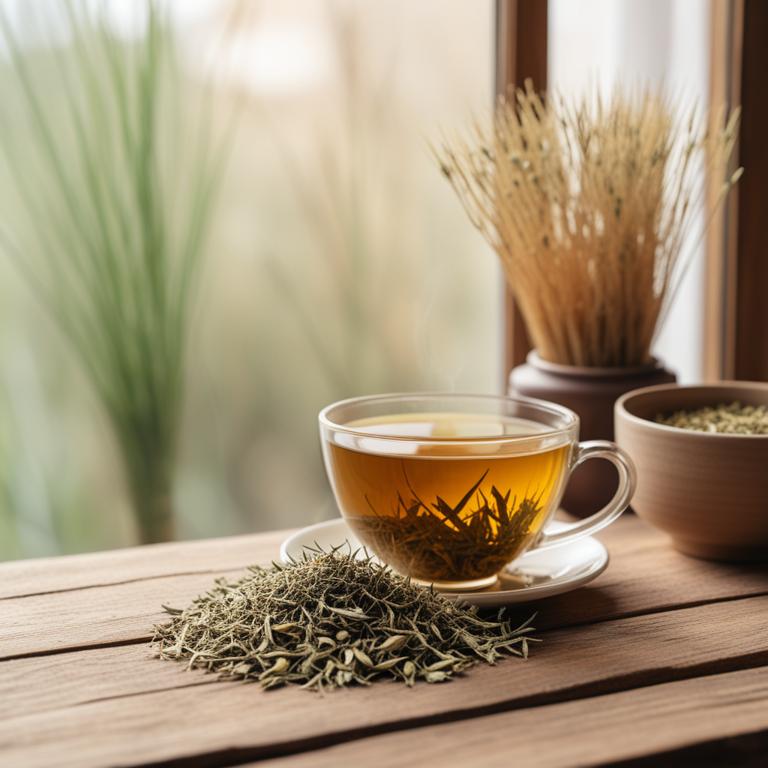
Herbal teas for brain fog are a type of natural remedy that aims to improve mental clarity, focus, and memory by promoting relaxation and reducing mental fatigue.
These teas are made from various herbs that have been traditionally used to alleviate symptoms of brain fog, such as ginkgo biloba, which improves blood flow to the brain, and peppermint, which enhances mental alertness.
Other examples of herbal teas that can help treat brain fog include Bacopa monnieri, which is known for its cognitive-boosting properties, and Ashwagandha, which helps to reduce stress and anxiety.
Additionally, teas like Rhodiola rosea, green tea, and lavender can also be beneficial in treating brain fog by promoting relaxation, reducing inflammation, and improving overall brain function.
According to "Advances in experimental medicine and biology", teas for brain fog may be beneficial, as certain teas like green tea and others containing polyphenolic constituents, such as turmeric, have been identified to have anti-amyloidogenic activity and potential neuroprotective benefits.
Below there's a list of the 11 best herbal teas for brain fog.
- 1. Bacopa monnieri teas
- 2. Panax ginseng teas
- 3. Centella asiatica teas
- 4. Ginkgo biloba teas
- 5. Rhodiola rosea teas
- 6. Schisandra chinensis teas
- 7. Lavandula angustifolia teas
- 8. Melissa officinalis teas
- 9. Valeriana officinalis teas
- 10. Crocus sativus teas
- 11. Passiflora incarnata teas
Also you may be interested in...
TODAY'S FREE BOUNDLE
Herb Drying Checklist + Herbal Tea Shopping List + Medicinal Herbs Flashcards
Enter you best email address below to receive this bundle (3 product valued $19.95) for FREE + exclusive access to The Aphotecary Letter.
$19.95 -> $0.00
1. Bacopa monnieri teas
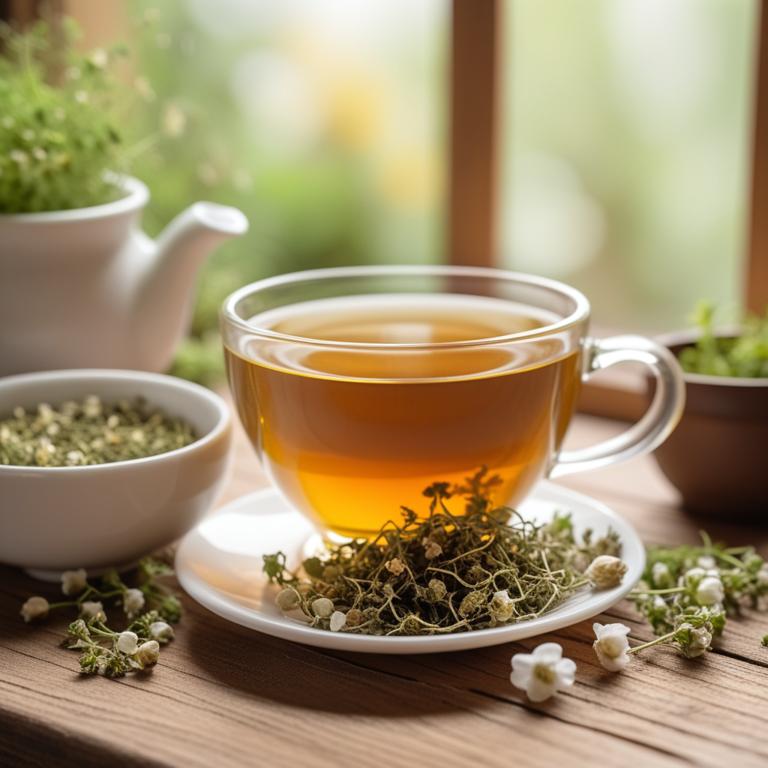
Bacopa monnieri teas have been traditionally used to treat brain fog, a condition characterized by mental fogginess, memory loss, and difficulty in concentrating.
The herbal preparation's adaptogenic properties help to reduce stress and anxiety, which can contribute to brain fog, promoting a balanced state of mind.
Bacopa monnieri teas contain bioactive constituents such as bacosides, which have been shown to improve memory, cognitive function, and neural communication, helping to alleviate brain fog symptoms.
Regular consumption of Bacopa monnieri teas may also improve mood, enhance focus, and boost overall brain health, making it a popular natural remedy for treating brain fog.
Related Study
According to "Alternative medicine review : a journal of clinical therapeutic", Bacopa monnieri teas for brain fog appear to have apparent anti-anxiety, anti-fatigue, and memory-strengthening effects.
2. Panax ginseng teas

Panax ginseng teas have been traditionally used to treat brain fog, a condition characterized by mental fogginess, confusion, and difficulty in concentrating.
The properties of this herbal preparation, which include adaptogenic and antioxidant properties, help to improve cognitive function and reduce oxidative stress, thereby alleviating brain fog symptoms.
The bioactive constituents of Panax ginseng, such as ginsenosides and polyphenols, are responsible for its therapeutic effects, including enhancing memory and reducing inflammation in the brain.
By promoting improved circulation, reducing inflammation, and enhancing neuroplasticity, Panax ginseng teas can help to improve mental clarity and reduce brain fog, providing a natural and effective solution for this common ailment.
Related Study
According to "Journal of Ginseng Research", Panax ginseng teas may be beneficial for brain fog due to the antioxidative and immunomodulatory activities of its ginsenoside components, which can act as antioxidants, modulators of intracellular neuronal signaling and metabolism, cell survival/death genes, and mitochondrial function.
3. Centella asiatica teas
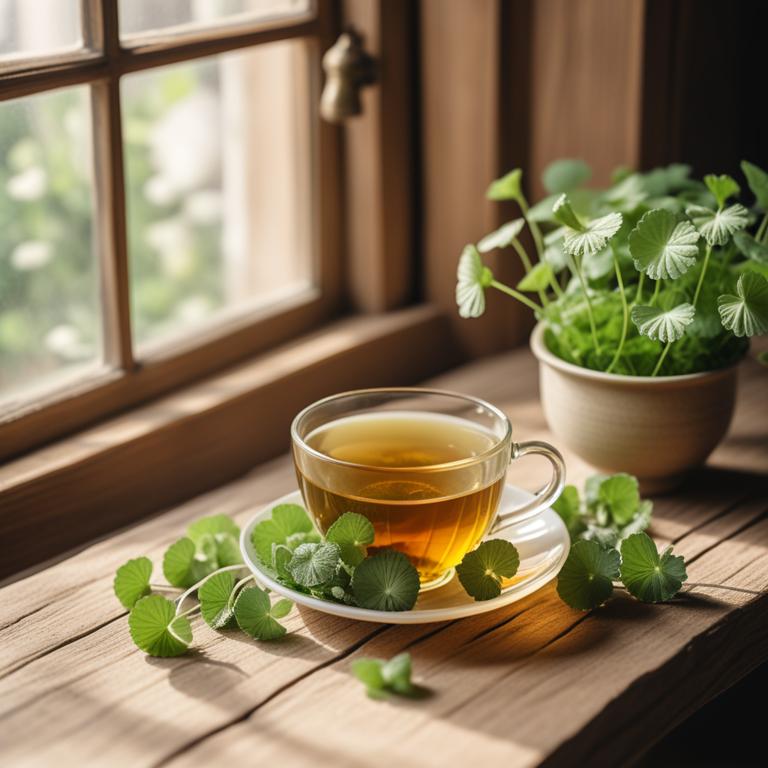
Centella asiatica teas have been traditionally used to treat brain fog, a condition characterized by impaired cognitive function and mental fatigue.
The bioactive constituents of Centella asiatica, including asiatic acid, madecassic acid, and brahmoside, help to enhance blood flow to the brain, improve memory, and reduce oxidative stress, thereby alleviating brain fog.
By promoting neuroprotection and neuroregeneration, Centella asiatica teas support the health of neurons and neural connections, leading to improved cognitive function and reduced mental fatigue.
Regular consumption of Centella asiatica teas has been associated with various benefits, including enhanced mental clarity, improved memory, and reduced symptoms of anxiety and depression.
Related Study
According to the study, Centella asiatica teas for brain fog may be beneficial as they improved working memory deficit and mitigated neuronal loss in the hippocampus, potentially helping to alleviate symptoms of brain fog.
4. Ginkgo biloba teas

Ginkgo biloba teas have been traditionally used to treat brain fog, a common symptom of various cognitive impairments.
The properties of this herbal preparation that help to treat this ailment include its antioxidant and anti-inflammatory properties, which help to improve blood flow to the brain and reduce oxidative stress.
The bioactive constituents of Ginkgo biloba, such as flavonoids and terpenoids, particularly bilobalide and ginkgolides, have been shown to have neuroprotective effects and improve cognitive function.
The benefits of Ginkgo biloba teas in treating brain fog include improved memory, reduced fatigue, and enhanced mental clarity, making them a popular natural remedy for cognitive health.
Related Study
According to "Presse medicale (Paris, France : 1983)", Ginkgo biloba teas for brain fog may be beneficial, as research suggests that a 600 mg dose of Ginkgo biloba extract significantly improved short-term memory in a double-blind trial.
5. Rhodiola rosea teas
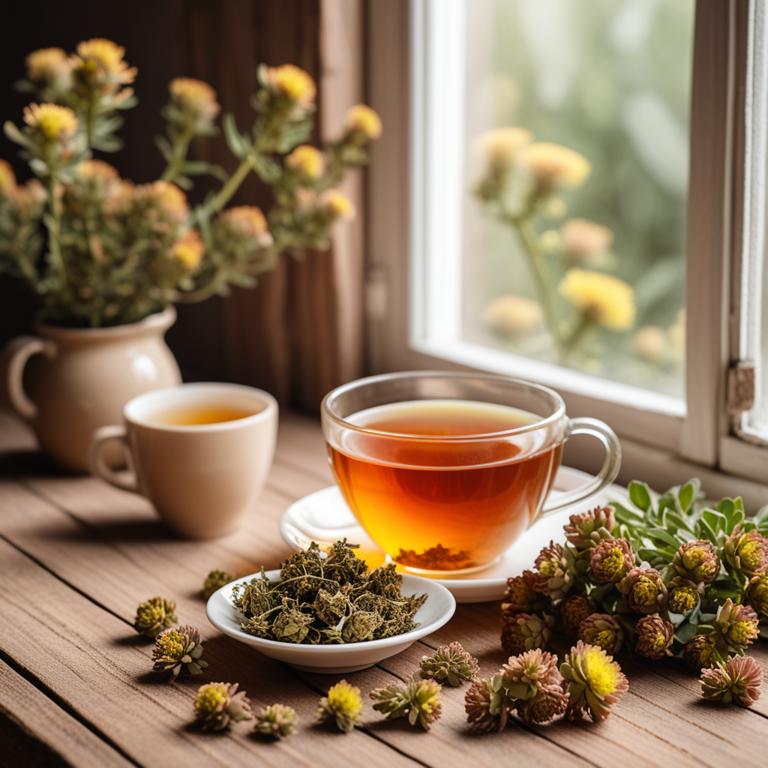
Rhodiola rosea teas have been used traditionally to treat brain fog, a condition characterized by mental fogginess and decreased cognitive performance.
The adaptogenic properties of this herbal preparation help to reduce stress and anxiety, which are often underlying causes of brain fog.
The bioactive constituents of Rhodiola rosea, including rosavin and salidroside, have been shown to improve mental clarity and memory by enhancing neurotransmitter activity and protecting against oxidative stress.
Regular consumption of Rhodiola rosea teas has been found to improve mental focus and concentration, and may also have a positive impact on mood and overall cognitive function.
6. Schisandra chinensis teas
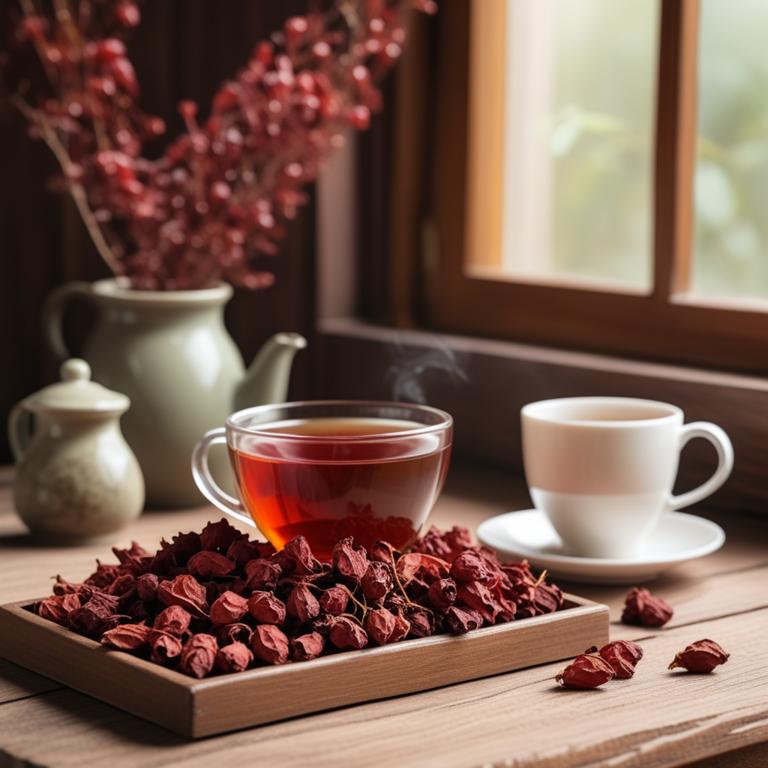
Schisandra chinensis teas have been used in traditional medicine to treat brain fog, a condition characterized by mental fogginess, fatigue, and decreased cognitive function.
The bioactive constituents of Schisandra chinensis, including schisandrins, schisandrin B, and schisandrin C, exhibit antioxidant and anti-inflammatory properties that help to improve cognitive function and reduce oxidative stress.
These properties help to reduce brain fog by improving blood flow to the brain, reducing inflammation, and protecting neurons from damage, ultimately leading to improved mental clarity and focus.
Regular consumption of Schisandra chinensis teas may also benefit those suffering from brain fog by promoting relaxation, reducing stress levels, and enhancing overall brain health.
Related Study
According to the provided study, Schisandra chinensis teas for brain fog may be beneficial as it was identified as the most effective herb against cell death and proliferation of progenitor cells in the hippocampus of a kainic acid (KA) mice model.
7. Lavandula angustifolia teas

Lavandula angustifolia teas have been traditionally used to treat brain fog, a condition characterized by mental fogginess, lack of focus, and memory impairment.
The bioactive constituents of Lavandula angustifolia, such as linalool and linalyl acetate, possess anti-inflammatory, antioxidant, and neuroprotective properties that help to improve cognitive function and reduce inflammation in the brain.
By promoting relaxation, reducing stress and anxiety, and improving sleep quality, Lavandula angustifolia teas help to alleviate brain fog by enhancing mental clarity and focus.
The benefits of using Lavandula angustifolia teas to treat brain fog include improved memory and concentration, enhanced mood, and reduced symptoms of anxiety and depression.
8. Melissa officinalis teas

Melissa officinalis teas, also known as lemon balm teas, have been traditionally used to treat brain fog and its associated symptoms.
The properties of Melissa officinalis teas that help to treat brain fog include their ability to promote relaxation, reduce anxiety and stress, and improve sleep quality.
The bioactive constituents of Melissa officinalis teas, such as rosmarinic acid, apigenin, and luteolin, have been shown to possess antioxidant and anti-inflammatory properties, which help to reduce oxidative stress and inflammation in the brain.
The benefits of using Melissa officinalis teas to treat brain fog include improved cognitive function, enhanced mental clarity, and a reduction in symptoms such as memory loss and difficulty concentrating.
Related Study
According to "Current pharmaceutical design", Melissa officinalis teas for brain fog may be beneficial due to their ability to bind directly to both nicotinic and muscarinic receptors in human brain tissue.
9. Valeriana officinalis teas

Valeriana officinalis teas have been used for centuries to treat brain fog, a condition characterized by mental fogginess and lack of focus.
The herbal preparation's sedative and anxiolytic properties help to treat this ailment by promoting relaxation and reducing stress, allowing the brain to function more clearly.
The bioactive constituents of Valeriana officinalis, including valerenic acid, isovaleric acid, and valepotriates, are responsible for its therapeutic effects, which include reducing inflammation and improving sleep quality.
By promoting relaxation, reducing stress, and improving sleep quality, Valeriana officinalis teas offer a natural and effective way to alleviate brain fog and improve cognitive function.
Related Study
According to "Praxis", Valeriana officinalis teas for brain fog may not be a cause for concern regarding residual sedative effects, as they showed improved subjective self-assessment and did not impair vigilance or cognitive performance on the following morning.
10. Crocus sativus teas
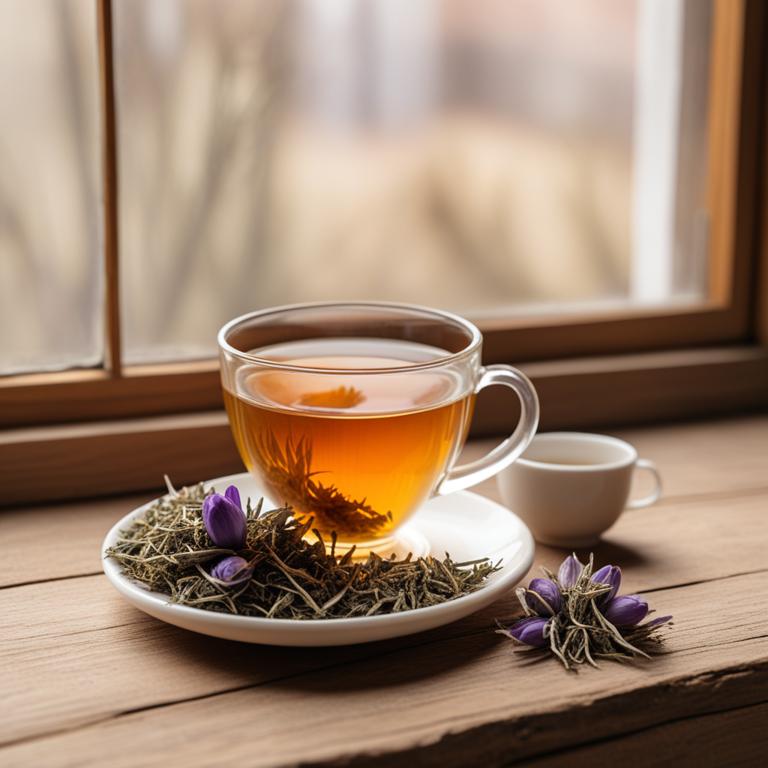
Crocus sativus teas, also known as saffron tea, have been traditionally used to treat brain fog, a condition characterized by mental fogginess and lack of focus.
The properties of Crocus sativus tea that help to treat brain fog include its ability to improve memory and cognitive function, thanks to its antioxidant and anti-inflammatory properties.
The bioactive constituents of Crocus sativus tea, including safranal and crocin, help to stimulate blood flow to the brain and reduce oxidative stress, which in turn helps to alleviate brain fog symptoms.
The benefits of using Crocus sativus tea to treat brain fog include improved mental clarity and focus, reduced fatigue, and enhanced overall cognitive function.
Related Study
According to "Behavioural pharmacology", Crocus sativus teas, particularly due to their high crocin content, may be beneficial in improving mental and cognitive dysfunctions, including brain fog, by potentially reversing the deleterious effects of sleep deprivation on mental and cognitive processes.
11. Passiflora incarnata teas
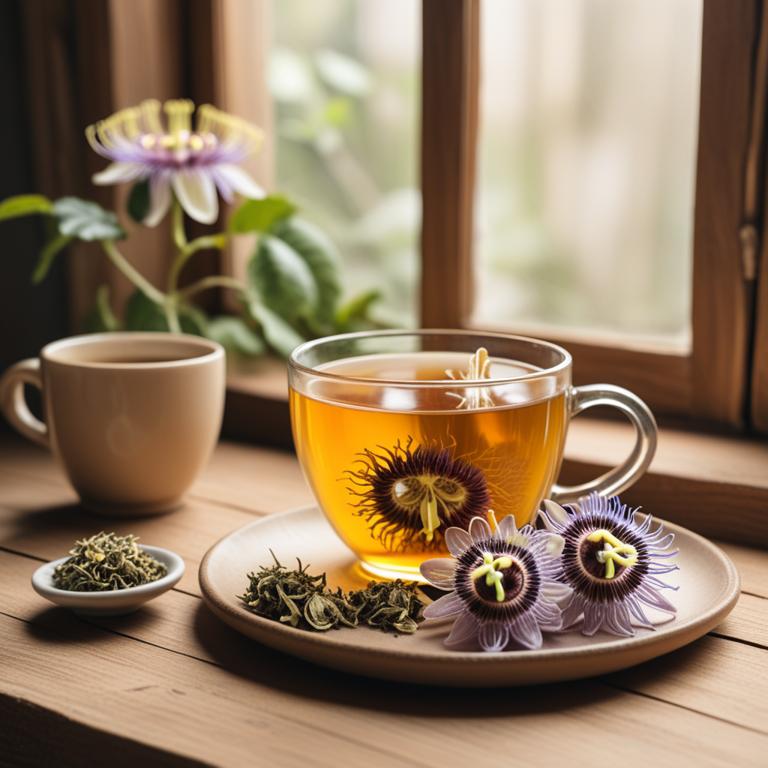
Passiflora incarnata teas have been traditionally used to treat brain fog, a condition characterized by mental fogginess and decreased cognitive function.
The properties of this herbal preparation, including its sedative and anti-anxiety effects, help to treat brain fog by promoting relaxation and reducing stress levels.
The bioactive constituents of Passiflora incarnata teas, such as flavonoids, alkaloids, and glycosides, contribute to its therapeutic effects by modulating the activity of neurotransmitters like GABA and serotonin, which play a crucial role in regulating mood and cognitive function.
Regular consumption of Passiflora incarnata teas has been found to improve focus, concentration, and mental clarity, making it a beneficial herbal preparation for individuals experiencing brain fog.